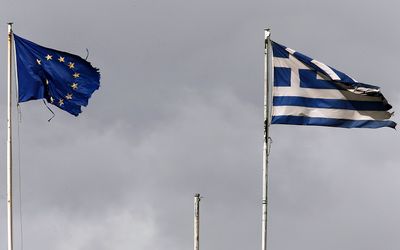Greek minister told to resign for using wrong name for Macedonia
by Agency Staff,
2016-03-16 20:01:27.0
AS thousands of migrants languish on Greece’s border with Macedonia following the closure of the Balkans route to western Europe, Athens has been gripped by another controversy — what ministers call its neighbour to the north.
Greece’s junior interior minister for migration Yiannis Mouzalas on Wednesday faced calls to resign after referring to the country as "Macedonia" instead of "Fyrom" (the Former Yugoslav Republic of Macedonia).
Athens denies its neighbour the use of the name Macedonia, claiming to have a historical right to it because the heart of Alexander the Great’s ancient kingdom lies in Greece’s own northern Macedonia region. Greece only recognises its neighbour, which gained independence after the collapse of Yugoslavia in the 1990s, by its United Nations-sanctioned name, Fyrom.
"I apologise for this error, which does not reflect my position and my convictions on the subject of Fyrom," said Mr Mouzalas, just hours after making the slip on the country’s Skai TV.
But the damage was done. On Wednesday, the small, nationalist Independent Greeks party (Anel), which is crucial to maintaining Prime Minister Alexis Tsipras’ wafer-thin parliamentary majority, called for Mr Mouzalas to resign.
"The apology by Mr Mouzalas is not enough, I demand his resignation," Anel leader and defence minister Panos Kammenos wrote in a tweet. He also convened a meeting of his parliamentary group to discuss the issue.
The main opposition New Democracy party echoed Anel’s calls for Mr Mouzalas to step aside.
Macedonia’s bid to join both the European Union and Nato have been blocked for decades by Greece over the issue of the country’s name.
Though several countries recognise Macedonia by that title, some European nations including France and Germany use Fyrom.
International talks to resolve the dispute are ongoing.
Government spokesman Olga Gerovassili played down the controversy caused by Mr Mouzalas’s remarks during a press conference, saying it "does not threaten the unity of the government".
She added that Prime Minister Alexis Tsipras would address the issue following Thursday’s crucial European migration summit with Turkey.
The summit, which will discuss Turkey’s terms for stemming the flow of migrants across its territory, is seen as crucial to relieving the pressure on Greece, where at least 43,000 refugees and migrants are currently stranded.
AFP

Frayed European Union and Greek flags flutter atop the Greek Ministry of Finance in central Athens. Picture: REUTERS
AS thousands of migrants languish on Greece’s border with Macedonia following the closure of the Balkans route to western Europe, Athens has been gripped by another controversy — what ministers call its neighbour to the north.
Greece’s junior interior minister for migration Yiannis Mouzalas on Wednesday faced calls to resign after referring to the country as "Macedonia" instead of "Fyrom" (the Former Yugoslav Republic of Macedonia).
Athens denies its neighbour the use of the name Macedonia, claiming to have a historical right to it because the heart of Alexander the Great’s ancient kingdom lies in Greece’s own northern Macedonia region. Greece only recognises its neighbour, which gained independence after the collapse of Yugoslavia in the 1990s, by its United Nations-sanctioned name, Fyrom.
"I apologise for this error, which does not reflect my position and my convictions on the subject of Fyrom," said Mr Mouzalas, just hours after making the slip on the country’s Skai TV.
But the damage was done. On Wednesday, the small, nationalist Independent Greeks party (Anel), which is crucial to maintaining Prime Minister Alexis Tsipras’ wafer-thin parliamentary majority, called for Mr Mouzalas to resign.
"The apology by Mr Mouzalas is not enough, I demand his resignation," Anel leader and defence minister Panos Kammenos wrote in a tweet. He also convened a meeting of his parliamentary group to discuss the issue.
The main opposition New Democracy party echoed Anel’s calls for Mr Mouzalas to step aside.
Macedonia’s bid to join both the European Union and Nato have been blocked for decades by Greece over the issue of the country’s name.
Though several countries recognise Macedonia by that title, some European nations including France and Germany use Fyrom.
International talks to resolve the dispute are ongoing.
Government spokesman Olga Gerovassili played down the controversy caused by Mr Mouzalas’s remarks during a press conference, saying it "does not threaten the unity of the government".
She added that Prime Minister Alexis Tsipras would address the issue following Thursday’s crucial European migration summit with Turkey.
The summit, which will discuss Turkey’s terms for stemming the flow of migrants across its territory, is seen as crucial to relieving the pressure on Greece, where at least 43,000 refugees and migrants are currently stranded.
AFP





















Change: 0.26%
Change: 0.41%
Change: 0.74%
Change: 0.41%
Change: -0.46%
Data supplied by Profile Data
Change: -0.01%
Change: 0.90%
Change: 0.26%
Change: 0.00%
Change: 0.66%
Data supplied by Profile Data
Change: 0.82%
Change: 0.68%
Change: 0.64%
Change: 1.03%
Change: 0.82%
Data supplied by Profile Data
Change: 0.17%
Change: -0.31%
Change: 0.94%
Change: 0.17%
Change: -0.05%
Data supplied by Profile Data